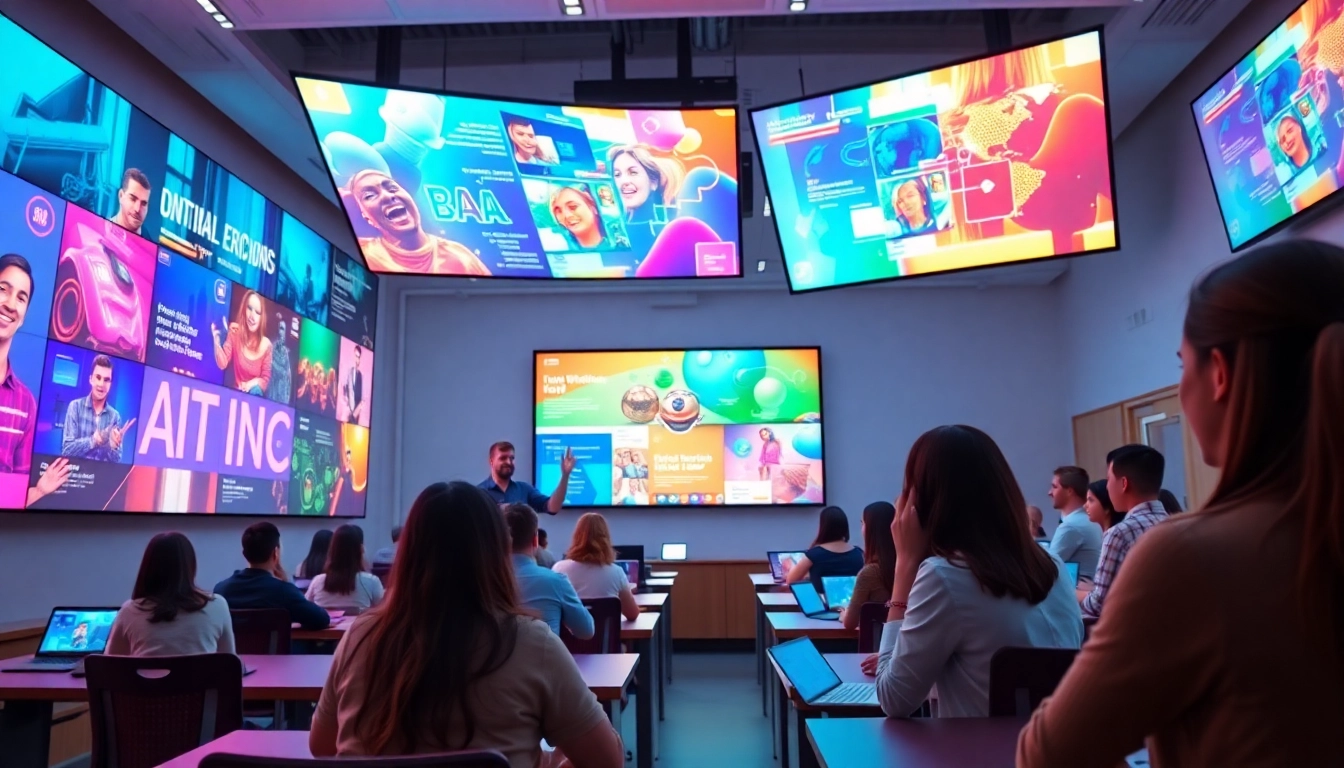Transforming Education with an AI Course Builder: A Deep Dive into Personalized Learning at Scale
In today’s rapidly evolving educational landscape, the demand for personalized, engaging, and efficient course content has never been higher. Educators, instructional designers, and corporate trainers are seeking innovative solutions to streamline their content creation processes while ensuring each learner receives a tailored experience that maximizes retention and motivation. Enter the AI course builder. This cutting-edge technology is revolutionizing how educational content is developed, delivering a powerful combination of speed, customization, and interactivity that traditional methods simply cannot match.
Understanding the Role of an AI Course Builder in Modern Education
What Is an AI Course Builder and Its Core Benefits
An AI course builder is an advanced platform that leverages artificial intelligence to automate and enhance the creation of online courses. Unlike manual content development, which can be time-consuming and resource-intensive, AI course builders utilize algorithms and machine learning to generate, customize, and deliver engaging educational materials rapidly. They allow educators to focus on pedagogical strategy instead of technical logistics, making high-quality, personalized learning experiences accessible at scale.
The core benefits of such platforms include substantial time savings, increased content diversity, and the ability to deliver tailored lessons suited to individual learner needs. For instance, Mexty’s AI-driven tools enable instructors to develop SCORM-compliant interactive courses, quizzes, and assessments in mere minutes, adapting to various learning styles—visual, auditory, or kinesthetic—without sacrificing quality.
For more insights on this transformative technology, explore the comprehensive capabilities of the AI course builder platform.
How AI Personalizes Learning at Scale
Personalization in education aims to cater to each student’s unique learning style, pace, and preferences. Traditional content often struggles to achieve this due to limitations in scalability and customization. AI course builders break these barriers by dynamically adjusting content based on learner data, engagement metrics, and feedback.
Through sophisticated algorithms, AI analyzes student interactions—such as quiz results, video engagement, and completion rates—and refines subsequent content delivery accordingly. This continuous loop ensures that each learner receives specific support and challenges, fostering better comprehension and motivation. For example, if a student demonstrates difficulty with a concept, AI can automatically generate supplementary explanations, multimedia resources, or practice exercises tailored to their needs.
Such scalability of personalized learning significantly improves outcomes, maintains engagement, and reduces educator workload—empowering institutions to serve diverse student populations effectively.
Challenges Traditional Content Creation Faces Compared to AI Solutions
Conventional course development often involves lengthy processes—content writing, multimedia production, assessments, and revisions—that can delay time-to-market and reduce agility. Additionally, manual content tends to be static, limiting adaptability to individual learners’ needs.
Furthermore, traditional methods pose difficulties in maintaining engagement, especially when courses become monotonous or overly standardized. Balancing quality with personalization typically requires extensive resources, which are often scarce in educational institutions and organizations.
AI solutions address these obstacles by automating repetitive tasks, enabling rapid content iteration, and offering diverse multimedia integration—such as AI-generated videos, quizzes, and speech synthesis—without burdening educators. The result is a more responsive, versatile learning environment capable of real-time customization that enhances student success.
Key Features and Functionalities of an Effective AI Course Builder
Rapid Content Development and Customization Tools
An effective AI course builder provides intuitive interfaces for quick authoring—allowing educators to generate entire courses, lessons, and assessments within minutes. These platforms incorporate templates, prompts, and AI-assisted writing tools that help streamline content creation, ensuring consistency and professionalism.
Customizable modules enable educators to tailor content, adjust difficulty levels, and incorporate brand or institutional branding seamlessly. Advanced features may include AI-generated text, voiceovers, and adaptable layouts, empowering users to produce highly personalized courses with minimal effort.
Integration of Multimedia and Interactive Elements
Engagement is critical for effective learning. An AI course builder supports integration of various media types—videos, animations, images, and interactive simulations—to cater to different learning preferences. For example, AI-powered video synthesis can produce instructor-led videos automatically, enriching the content without hiring video production teams.
Furthermore, interactive components such as drag-and-drop activities, quizzes, and branching scenarios foster active participation. These features improve retention and make learning both enjoyable and impactful.
Compatibility with SCORM and Learning Management Systems
Compatibility is essential for seamless deployment and tracking. Top AI course builders ensure output formats adhere to SCORM, xAPI, or Tin Can standards, facilitating integration with popular Learning Management Systems (LMS) like Moodle, Canvas, or Blackboard. This interoperability enables educators to consolidate data, monitor learner progress, and maintain comprehensive records effortlessly.
Implementation Strategies for Maximizing AI Course Builder Usage
Designing Learner-Centric Courses with AI Assistance
To harness the full potential of an AI course builder, start with a clear understanding of your learner profiles. Use data and feedback to identify learning preferences, prior knowledge, and areas of difficulty. Then, utilize AI-driven tools to create adaptive content that responds to individual needs, ensuring courses are engaging and effective.
Incorporate multimedia elements aligned with pedagogical goals, fostering multisensory learning. Continuously monitor engagement metrics to tweak content for optimal outcomes.
Automating Quizzes and Assessments for Better Engagement
AI excels at generating varied question types—multiple-choice, fill-in-the-blank, scenario-based, and more—based on the content. Automating assessments simplifies grading and instant feedback, which are vital for reinforcing learning.
Advanced platforms can even adapt the difficulty of questions dynamically and personalize retake options based on learner performance—driving motivation and mastery.
Leveraging Community Features for Content Sharing and Collaboration
Community features foster peer-to-peer support, idea exchange, and co-creation. Educational platforms like Mexty connect users—teachers, trainers, and content creators—who can remix, share, and improve courses collaboratively. This ecosystem accelerates innovation and enriches content quality, reducing individual workload while expanding resource pools.
Measuring Success and Improving Courses Over Time
Tracking Student Progress and Learning Outcomes
Automated analytics dashboards provide insights into learner engagement, quiz performance, and module completion rates. Using these data points, educators can identify learning bottlenecks and areas needing reinforcement.
Gathering Feedback to Refine Course Content
Regular feedback surveys, embedded within courses, help gather qualitative insights. AI can analyze this feedback to suggest targeted improvements, update content, and optimize the learning experience iteratively.
Scaling Personalization Without Increasing Workload
AI platforms enable the creation of personalized pathways for individual students without adding significant administrative burdens. By automating content adjustments and assessments, teachers can support larger cohorts effectively, ensuring equitable learning experiences.
Future Trends and Benefits of AI in Education
Emerging Technologies Enhancing Course Creation
Upcoming innovations include AI-driven virtual tutors, adaptive learning algorithms, and immersive AR/VR experiences. These advancements will empower educators to deliver even more engaging, responsive content that caters to diverse learning environments.
Long-Term Impact on Educator Productivity and Student Success
As AI tools become more sophisticated, educators will spend less time on administrative and repetitive tasks, freeing up resources for personalized mentoring and innovation. Students will benefit from highly tailored learning journeys that foster deeper understanding and retention.
Adopting AI Course Builders for Competitive Edge
Institutions embracing AI-driven content creation gain a strategic advantage by offering modern, flexible, and scalable courses. This adaptability is critical in a competitive market where up-to-date, personalized education can determine success.


